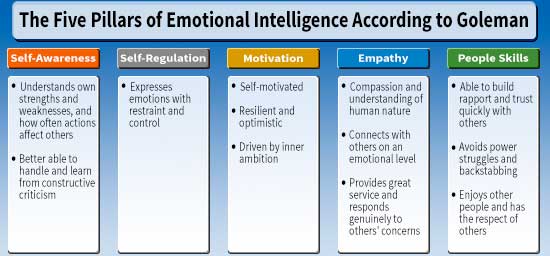The emotional intelligence (aka emotional quotient) of senior leaders is a success determinant. Research has shown that there is a relationship between a leader’s success and his/her EI.
- “Of all the people we’ve studied at work, we’ve found that 90% of top performers are also high in emotional intelligence. On the flip side, just 20% of bottom performers are high in emotional intelligence.” Travis Bradberry in Forbes (Daniel Goleman’s co-author)
- “It is directly related to the bottom line. Pepsi found that executives with high EQs generated 10% more productivity, had 87% less turnover, brought $3.75 MM more value to the company, and increased ROI by 1000%. L’Oréal found that salespeople with a high EQ sold $2.5 MM more than others. And when Sheraton decided to incorporate an EQ initiative, their market share grew by 24%.” Anne Loehr in Huffington Post
Clearly, it would be wise to set the stage for 2018 by assessing and developing your own EI, and helping your leadership team do the same.
Daniel Goleman says there are 5 pillars of EI, which can be separated into personal competence and social competence.
There is much written about EI and many tools to help you assess yours. Here is a start from Harvard.edu, Assessing Your Emotional Intelligence. Other tools are available through Bradberry and Greaves and from Goleman.
The five pillars give a framework to begin to think about and self-evaluate where you believe you should focus your attention. Everyone will be different. Some of the development opportunities we find with senior leaders we coach are these areas:
- Self-awareness/understanding their impact on others is an area many leaders need to improve on. Executives need to remember that their emotions, and actions they may take based on emotions, have an enormous impact on others in the organization. A senior leader’s actions tend to cause a ripple effect—like a stone in water. Many executives build self-awareness via journaling; it is a useful technique.
- Composure is an area some leaders are challenged by. A leader who blows his stack is both scary and demotivating. Understand your triggers. Count to ten.
- Interpersonal interactions are affected by how you feel. Are you tired and short tempered or well-rested and relaxed? Take care of your Executive Vitality™—it affects all areas of your life: play, work, health, finances, spirituality, relationships, sleep, food, exercise, and especially, your personal and work relationships.
Both your degree of emotional intelligence and perception of it are affected by these components: self-awareness, composure, and Executive Vitality. You may want to have your team evaluate themselves using one of the tools available and build focus on emotional intelligence into your team meetings throughout the year.
How do you see emotional intelligence affecting performance? What do you and your team need to work on?










